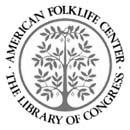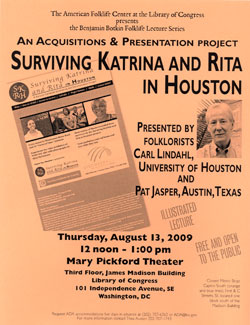| |
|||
|
|
The American Folklife Center at the Library of Congress August 13, 2009 Event Flyer Surviving Katrina and Rita in HustonPresented by Carl Lindahl and Pat Jasper
Surviving Katrina and Rita in Houston (SKRH) is a thoroughly folkloric response to a national catastrophe, drawing upon the survivors’ personal resources to recreate their vanished communities and to forge new ones. It is a community self-documentation project, the world's first in which disaster survivors take the lead in narrating their experience of disaster. The soul of the project is stories: stories chronicling communities that now exist only in memory, stories of courage and commitment in the face of unimaginable adversity, and stories of personal and social healing in the wake of the storms. In sharing their stories, survivor narrators and survivor interviewers work together to create a record on their own terms. The resulting recordings constitute not only an insider's view of the greatest overnight displacement in American history, but also the self-portrait of a community that has been badly mischaracterized by the popular media. Thus, the great majority of survivors wish to share their voices not only with future researchers, but more importantly, today, with their present neighbors in Houston. The sound recordings are archived at the American Folklife Center and at the University of Houston, but they are also voiced in radio programs and public art installations; in addition, the survivors' voices and arts are featured in public panels and performances. Hurricane Katrina struck New Orleans on August 29, 2005. SKRH was born three days later, before buses began emptying New Orleans’s Superdome into Houston's Astrodome. Two Texas folklorists, Carl Lindahl and Pat Jasper, sought the support of the American Folklife Center to shape a project through which Katrina survivors would receive training and stipends to record fellow survivors. The goal was to meet three pressing needs: survivors were in great need of money; they would benefit from training that would help them find new employment; and they felt a need to tell and hear their stories. As folklorists, Lindahl and Jasper realized that story-sharing was the greatest need of all, and this conviction has been borne out repeatedly by narrators and interviewers expressing the sense of healing and validation that they have experienced in the storytelling process. Aided by the expertise of the American Folklife Center staff, Lindahl and Jasper put together a training program stressing "natural narratives" shaped by community experience and tradition. The premises, though simple to express, were difficult to master.
This narrative-centered approach is important not only because it is the most effective for the survivors' healing processes, but also because it will help responders to future disasters shape behavioral health efforts that make the most of the survivors' traditional healing strategies. Carl Lindahl 
The American Folklife Center was created by Congress in 1976 and placed at the Library of Congress to "preserve and present American Folklife" through programs of research, documentation, archival preservation, reference service, live performance, exhibition, public programs, and training. The Center includes the American Folklife Center Archive of folk culture, which was established in 1928 and is now one of the largest collections of ethnographic material from the United States and around the world. Please visit our web site. |
| ||||

